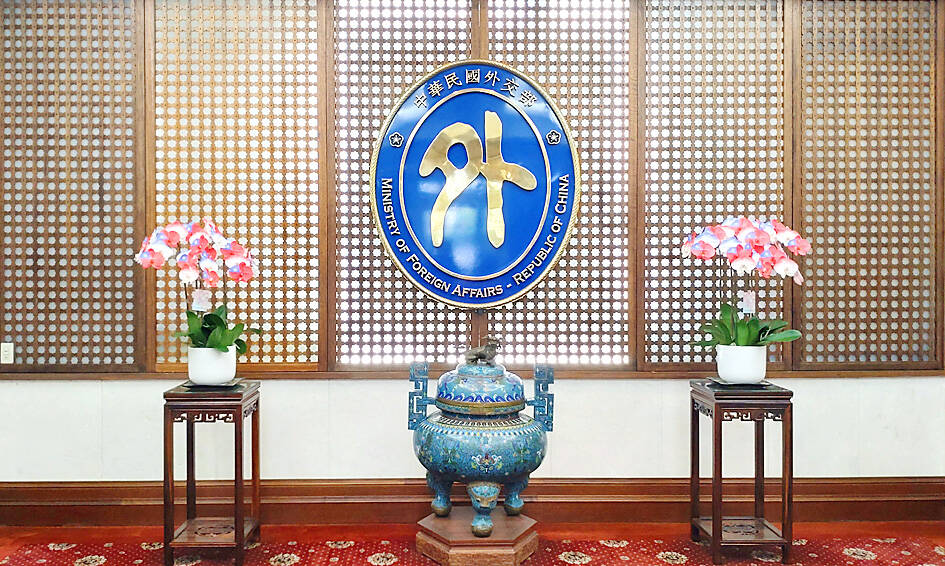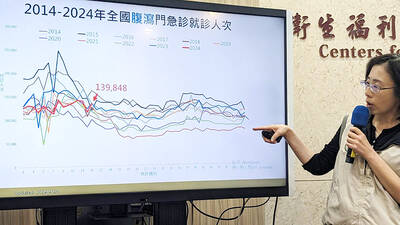Vice Minister of Foreign Affairs Alexander Yui (俞大?) last month visited Taiwan’s Latin American allies in a bid to cement relations amid rumors that some could sever diplomatic ties with Taipei, a source familiar with the issue said.
After the Chinese Communist Party’s 20th National Congress in October last year, Minister of Foreign Affairs Joseph Wu (吳釗燮) said there were “signs” and intelligence suggesting that a few allies might consider cutting ties with Taiwan.
Paraguayan opposition party presidential candidate Efrain Alegrehas has said that his country would cut diplomatic ties with Taiwan in favor of China if he wins an election scheduled for April.

Photo: Yang Cheng-yu, Taipei Times
Paraguayan President Mario Abdo Benitez in September last year asked Taipei to invest US$1 billion in the country to maintain diplomatic ties, as it would help him resist pressure from Beijing to switch diplomatic recognition.
Honduran President Xiomara Castro said she would consider severing ties with Taiwan during an election campaign in November 2021. Although Paraguay continued to maintain diplomatic ties with Taiwan after Castro was elected, Honduran Minister of Foreign Affairs Eduardo Enrique Reina said “we are maintaining a fluid relationship.”
Reina on Jan. 1 met with Chinese Vice Minister of Foreign Affairs Xie Feng (謝鋒) to discuss trade issues, and former Honduran president Jose Manuel Zelaya — Castro’s husband — advocated for ties with Beijing.
The Community of Latin American and Caribbean States summit is to be held in Argentina on Tuesday next week. US and Chinese leaders have also been invited.
Some political watchers have said that if Chinese President Xi Jinping (習近平) attends the summit, he might interact with Castro, who has confirmed her attendance.
Due to China’s attempts to convince Taiwan’s allies to switch official recognition to Beijing, Taipei has 14 diplomatic allies: the Marshall Islands, Nauru, Palau and Tuvalu in the Pacific; Eswatini in Africa; the Holy See in Europe; Belize, Guatemala, Haiti, Honduras and Paraguay in Latin America, and Saint Kitts and Nevis, Saint Lucia, and Saint Vincent and the Grenadines in the Caribbean.
Four of the eight countries that severed ties with Taiwan since President Tsai Ing-wen (蔡英文) took office in 2016 are Latin American countries: Panama, the Dominican Republic, El Salvador and Nicaragua.
Taipei’s relations with many of the region’s allies remain healthy, political watchers have said, and leaders from allies in Central America and the Caribbean visited Taiwan last year.
Saint Vincent and the Grenadines Prime Minister Ralph Gonsalves was the first head of state to visit Taipei to show his support after China conducted military drills around Taiwan in August last year.
Belizean Prime Minister John Briceno has had frequent interactions with high-level officials in Taiwan, and led a delegation to Taiwan in March last year.
Guatemalan President Alejandro Giammattei has openly supported Taiwan many times and has invited Tsai to cohost a planned summit of states that maintain diplomatic relations with Taipei.
Haiti continues to engage in bilateral cooperation projects with Taiwan and has spoken out for the country at the UN.

FLU SEASON: Twenty-six severe cases were reported from Tuesday last week to Monday, including a seven-year-old girl diagnosed with influenza-associated encephalopathy Nearly 140,000 people sought medical assistance for diarrhea last week, the Centers for Disease Control (CDC) said on Tuesday. From April 7 to Saturday last week, 139,848 people sought medical help for diarrhea-related illness, a 15.7 percent increase from last week’s 120,868 reports, CDC Epidemic Intelligence Center Deputy Director Lee Chia-lin (李佳琳) said. The number of people who reported diarrhea-related illness last week was the fourth highest in the same time period over the past decade, Lee said. Over the past four weeks, 203 mass illness cases had been reported, nearly four times higher than the 54 cases documented in the same period

A group of Taiwanese-American and Tibetan-American students at Harvard University on Saturday disrupted Chinese Ambassador to the US Xie Feng’s (謝鋒) speech at the school, accusing him of being responsible for numerous human rights violations. Four students — two Taiwanese Americans and two from Tibet — held up banners inside a conference hall where Xie was delivering a speech at the opening ceremony of the Harvard Kennedy School China Conference 2024. In a video clip provided by the Coalition of Students Resisting the CCP (Chinese Communist Party), Taiwanese-American Cosette Wu (吳亭樺) and Tibetan-American Tsering Yangchen are seen holding banners that together read:

UNAWARE: Many people sit for long hours every day and eat unhealthy foods, putting them at greater risk of developing one of the ‘three highs,’ an expert said More than 30 percent of adults aged 40 or older who underwent a government-funded health exam were unaware they had at least one of the “three highs” — high blood pressure, high blood lipids or high blood sugar, the Health Promotion Administration (HPA) said yesterday. Among adults aged 40 or older who said they did not have any of the “three highs” before taking the health exam, more than 30 percent were found to have at least one of them, Adult Preventive Health Examination Service data from 2022 showed. People with long-term medical conditions such as hypertension or diabetes usually do not

Heat advisories were in effect for nine administrative regions yesterday afternoon as warm southwesterly winds pushed temperatures above 38°C in parts of southern Taiwan, the Central Weather Administration (CWA) said. As of 3:30pm yesterday, Tainan’s Yujing District (玉井) had recorded the day’s highest temperature of 39.7°C, though the measurement will not be included in Taiwan’s official heat records since Yujing is an automatic rather than manually operated weather station, the CWA said. Highs recorded in other areas were 38.7°C in Kaohsiung’s Neimen District (內門), 38.2°C in Chiayi City and 38.1°C in Pingtung’s Sandimen Township (三地門), CWA data showed. The spell of scorching